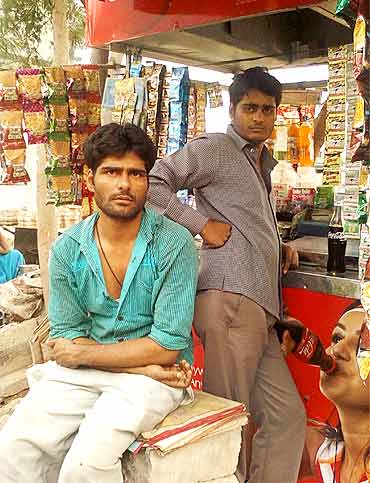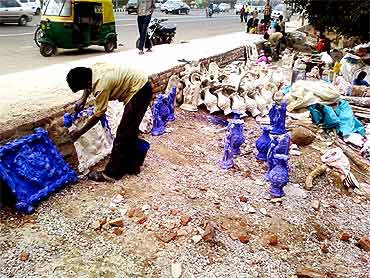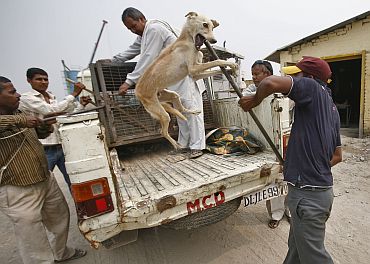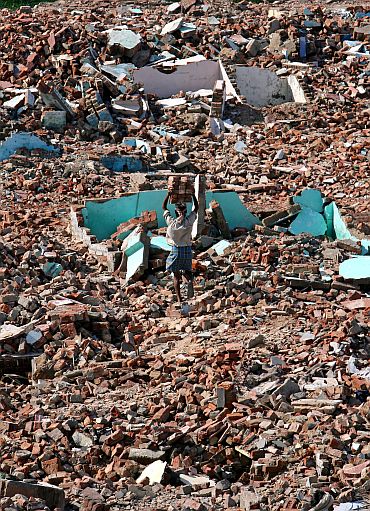Photographs: Sahim Salim/Rediff.com
From hawkers to homeless, around 2.5 lakh people were evicted from Delhi's streets before the Commonwealth Games to give the city a 'clean' look. But a month after the mega event they are back in business, reports Sahim Salim.
Delhi's attempts to put blankets over its 'undesirables' to present a pretty picture to the world during October's Commonwealth Games affected lakhs of people and even some animals. Many of them were forced out of the city, some jailed and many were harassed into hiding.
A month after the conclusion of the Games, those shunned away are slowly making their way back into the capital. From street vendors to hawkers, beggars to farmers and even street dogs, all are back on the roads, after being driven out of the city and left to fend for themselves with no compensation.
Those in the immediate vicinities of the CWG venues were the most affected as they were driven away months before the October mega event.
Raj Dulari, a 56-year-old woman with two children and a paralysed husband to feed, was running a tea stall on Noida Mor -- at a stone's throw distance from the Commonwealth Games Village -- for over 30 years. But before the Games she was asked to leave.
"About four months before the Games, policemen came to my stall and told me that I could not run my business during the Games. When I asked them why, they told me that it was a security concern. I am 56-years-old; why do the foreigners have to be afraid of me?" Dulari asked.
And after that her woes began.
"First they were polite. Then they started using force. I pleaded with them to be merciful considering my husband is bed-ridden and I have two children. But they did not budge. I continued to suffer losses at the hands of the police, so I stayed at home. For four months I have not earned a rupee," Dulari said.
She has reopened a stall a week ago, but says cops continue to harass her. "The Games are over but policemen keep coming back to destroy my stall," Dulari said.
...
'During CWG, we had to hide from the cops like thieves'
Image: Mohammed Salahuddin and his brother Shehzad have been finding it difficult to make ends meetPhotographs: Sahim Salim/Rediff.com
Mohammed Salahuddin runs a tobacco stall just next to Dulari's tea stall. When the police broke his soft drink bottles in an attempt to drive him away, he looked for alternate means to earn a living.
"We are three brothers. We hired a cart and sold vegetables for about three months by visiting one colony to another. But we had to be wary of the cops," Salahuddin said.
His brother, Shehzad, who sold soft drinks, said that the cops forced him to leave. "I purchased a cart by paying a deposit to a soft drinks dealer.Had the police destroyed the cart, I would not have got my deposit back. So I had to leave and hide from the police like I was some thief," said Shehzad.Jodhpur sculptors forced to return home after 13 years
Image: The sculptors allege that the police harassed them and destroyed their creationsPhotographs: Sahim Salim/Rediff.com
The same street was also home to a sculptor community, which migrated from Jodhpur in Rajasthan about 13 years ago. They made clay pots and statues and had settled in hutments in the same area, as their goods were too bulky to carry around.
All the stalls in a market behind Noida Mor in Mayur Vihar were also demolished on October 3. "There were around 150 stalls in this market. All of us were harassed and forced to leave our livelihood and return to our village. Some of us went into hiding," said Pawan Kumar Rai, another tea stall owner.
60,000 beggars evicted, only to return
Image: Beggars were sent to 12 shelters across Delhi before the Games and have now been let goPhotographs: Desmond Boylan/Reuters
Apart from vendors and hawkers, beggars were arrested or forced out of the city as well. Estimates suggest that there are over 60,000 beggars who were rounded up from various parts of the city and were either sent to one of the 12 shelters in Delhi or were driven out.
"We were just picked up and taken to a shelter in north Delhi. There were lots of other beggars there and it was stifling. It was like a jail," Prem Singh, 72, said, as he hurried to a car to ask for some alms.
But he lost his resolve the minute he saw the camera. "Please don't take our photo. They will send us back to that jail. We run away when we see anyone in khakhi. We are a matter of concern, but begging is our only means of living," he said.
'Home coming' for stray dogs
Image: Around 473 strays were picked up from various parts of the city before the GamesPhotographs: Reuters
As a part of the city's beautifications process, many stray dogs were also picked up and taken to shelters. But a month after the Games, they are back to where they belonged.
According to Geeta Seshamani, vice president, Friendicoes Society for the Eradication of Cruelty to Animals, a non-government organisation, which helped in providing shelter to strays during the Games, 473 strays were picked up from different parts of the city.
"We had to pick up strays as civic agencies were getting many complaints. We maintained strict records of the strays and relocated them to temporary shelters. All of them have now been released," Geeta said.'2.5 lakh people evacuated, with no compensation'
Image: Most rendered homeless by the Games were not rehabilitatedPhotographs: Desmond Boylan/Reuters
According to independent NGOs working with vendors and homeless, over 2.5 lakh people -- including street vendors, slum dwellers and cart pullers -- were affected as a part of the city's beautification process.
"These homeless had nowhere to go during the Games. No compensations were given to them. And the worst part is, a majority of these people had applied for licenses. There are 272 ward committees, 12 zonal committees, two appellate authorities for the Municipal Corporation of Delhi and New Delhi Municipal Committee and one high-powered committee to look into the licensing and rehabilitation of these vendors." said Arbind Singh, national coordinator for National Association of Street Vendors of India.
"Around 1,31,000 people had applied for licenses in 2007 by paying Rs 100 per application form. Sadly, not even one license has been issued till now and they are still at the mercy of civic authorities," he added.







article